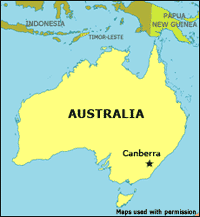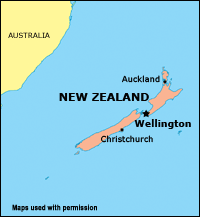Funds Transfer Scheme
Transfer of living expenses to a bank account in New Zealand
We have received information from various education providers that some overseas students are facing problems in obtaining part-time work in the current economic situation. Whilst all students are required by instructions to demonstrate that they have sufficient funds to pay for the tuition fee and to meet their living expenses in New Zealand, it appears that a majority of the Sri Lankan students may not be carrying sufficient funds for their living expenses and are looking for part-time work soon after entering New Zealand.As the economic growth slows down, overseas students might find it harder to get part-time work as more New Zealand residents and citizens will be looking for jobs. This could leave more international students disappointed which has the potential to adversely affect the New Zealand's reputation overseas.
In order to mitigate this risk Bangkok branch proposes to put in place a system requiring students to transfer at least 12 months’ living expenses to a bank account in New Zealand, in addition to paying the tuition fee for one year. The amount deposited in the bank is locked for a period of 12 months and then drip-fed to the student on a prearranged basis.
The banking option will work in one of the following three ways.
- Students will have an option to open an approved savings account with ANZ Bank in New Zealand from Sri Lanka and deposit the amount stipulated by INZ for cost of living support funds, into that account. They would then provide evidence of this with their visa application. If the application is declined, INZ will advise the bank and provide a copy of the biodata page from the student’s passport. ANZ will then remit the funds and the accrued interest back to a nominated bank account in Sri Lanka, or
- The student can indicate when the visa application is lodged that they will remit the funds to the ANZ bank account. This can be done by opening an account with ANZ and attaching a copy of the 'welcome letter' received in response along with the application. If they do this they will not be required to show INZ source of funds for cost of living expenses in New Zealand. If all other aspects of the application are positive the application will be considered a Positive Profile student. The student will then receive an Approval in Principal (AIP) letter requesting them to pay the course fee, deposit the cost of living funds in the ANZ account and provide INZ evidence of this within 30 days. A visa will then be issued. If, after receiving the AIP letter, the student declines to deposit the money, the application will be transferred back to the immigration officer for reassessment, or
- Where INZ Bangkok has concerns as to whether the money shown for cost of living in New Zealand will actually be made available to the student, the student will be offered the option of demonstrating that our concerns are unfounded by transferring that money to an ANZ account in New Zealand. Should the student choose not to transfer the money this will be taken into account in assessing whether the funds will be made available to the student to take to New Zealand and, therefore, whether the application meets instructions to be approved.
How the funds transfer scheme will operate
INZ has arranged with ANZ Bank in New Zealand to facilitate the funds transfer scheme.Step 1: The applicant completes the enquiry form available below and sends it with the first biodata page of their passport to ANZ Bank at indianz@anz.com.
Step 2: The applicant then lodges their student visa application with the branch along with evidence of having a reference number for the FTS account application issued by ANZ Bank.
Step 3: The INZ branch processes the student visa application and, if satisfied, notifies the applicant that they have been approved in principle.
Step 4: The applicant provides a copy of the AIP letter to ANZ Bank. An account will be opened and account details will be sent to the applicant. The applicant then approaches their bank in Sri Lanka to remit the money to the New Zealand account.
Step 5: ANZ Bank notifies INZ confirming the applicant’s account balance.
Step 6: Applicant submits fee receipt, ANZ account balance letter and other AIP requirements for issuance of a student visa.
Step 7: On arrival in New Zealand, the student visits the nearest ANZ Bank branch and activates their bank account after which the bank releases funds on a prorated basis from the student's holding accounts to the transaction accounts which the student can use for meeting living costs.
In the event that a student takes up the funds transfer option after submitting an application with INZ, step 2 will be redundant.
Note: Students will have only limited
access to the holding account. ANZ bank will notify INZ if students
request to withdraw money directly from their holding account.
The fund transfer scheme will ensure that the students are aware that whilst their student visa allows them part-time work in New Zealand, this work may not be readily available and will require them to make sufficient arrangements to meet their living expenses.
This is not a student instructions requirement but only an option that can be provided to students as an alternative to submitting numerous documents to demonstrate access to sufficient funds or alleviate any concerns that INZ may have with regard to funds shown by a student.
Advising students of the funds transfer option during the course of processing of an application
Students should be advised of the funds transfer option when INZ is not satisfied that the funds shown in support of a student visa application will not be available to the student, for example:- funds shown are not owned by an immediate family member
- funds shown are recent in nature and satisfactory evidence cannot be provided to establish the source of these funds.
Deciding applications under the Funds Transfer Scheme
When an application where the funds transfer option has been taken is approved, an additional AIP requirement would be that evidence is provided that the stipulated funds have been transferred to New Zealand. This evidence will be in the form of a confirmation of receipt of funds directly from ANZ Bank.Once the AIP requirements are met, the visa will be issued.
In the event that an application is declined and the funds have already been transferred to New Zealand, the immigration officer must advise ANZ Bank quoting the account number and the student’s details. ANZ Bank will then arrange for the funds and the accrued interest to be remitted back to a designated bank account in Sri Lanka.
Once the student arrives in New Zealand
On arrival in New Zealand the student will need to go to the nearest branch of the ANZ Bank to activate their transaction account and start the monthly payments into this account from the deposit account.In case the student terminates their study and intends to return to Sri Lanka, they will need to provide a letter from their institution confirming termination of education and air tickets. The outstanding amount in the savings account along with the accrued interest will be remitted back to a bank account in Sri Lanka. In such an event ANZ Bank will also advise INZ Bangkok for appropriate action.
Benefits of the process
For the students
- Allows students’ parents to have control over the amount of money that their child has access to in New Zealand.
- Ensures that the student will have access to sufficient money to meet cost of living expenses in New Zealand.
- It is a lot easier than the current alternatives available – where a range of documentation is required and/or a bank loan must be taken out.
- Applications submitted under this scheme will not be subjected to in-depth fund assessments which will reduce processing times.
For INZ
- Helps the immigration officer to determine the ability of parents to fund their child’s tuition and living costs in New Zealand.
- Cuts down on processing timeframes as in-depth funds verification and assessment is not required.
ANZ contact
The ANZ contact is Sunil Kaushal:Sunil Kaushal
Head of Indian Segment
ANZ New Zealand
Level 6, 209 Queen Street, Auckland, New Zealand
Phone: +64 9 252 4244 | Mobile: +64 21 280 4189 | Fax: +64 9 252 4233























